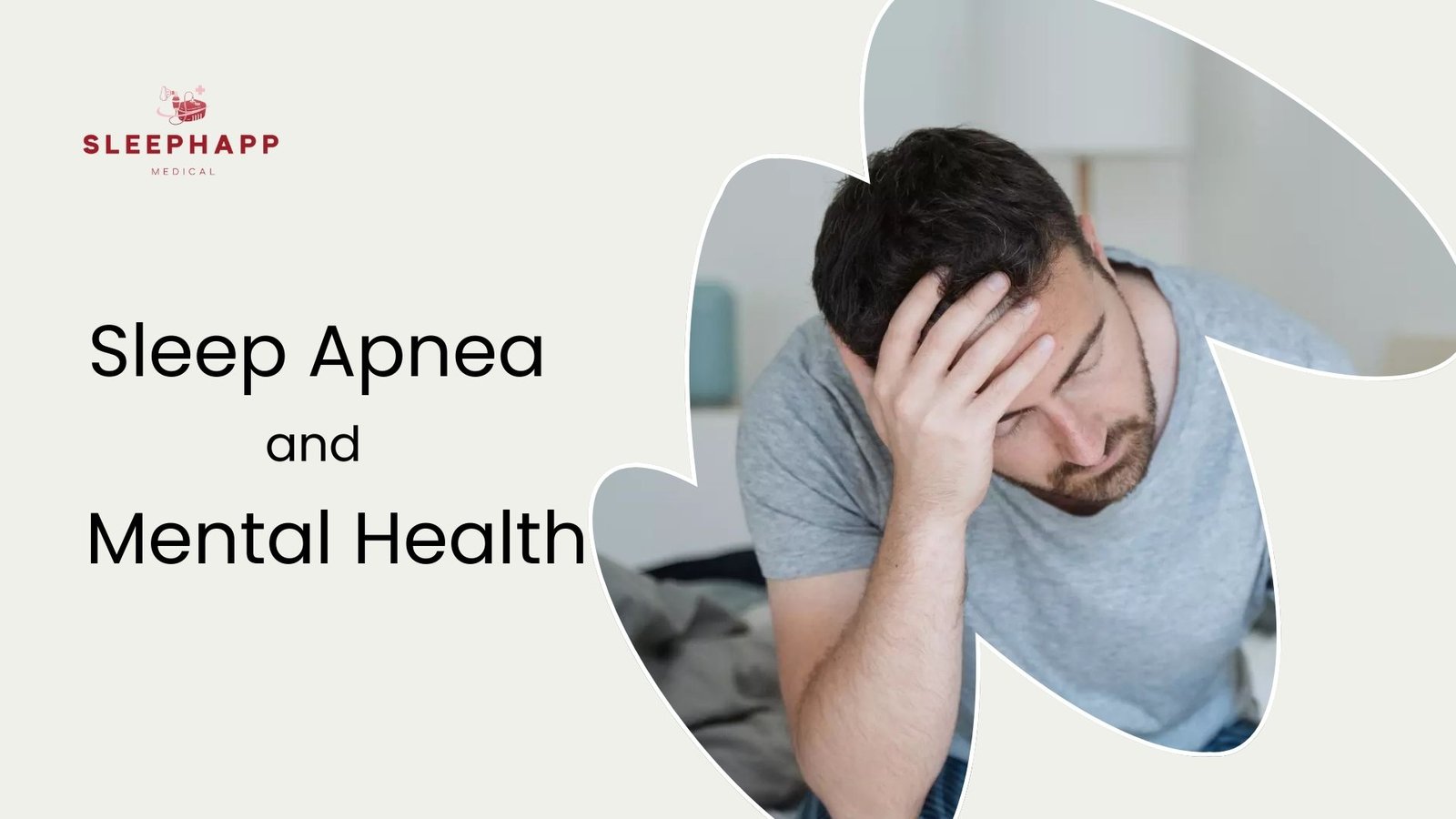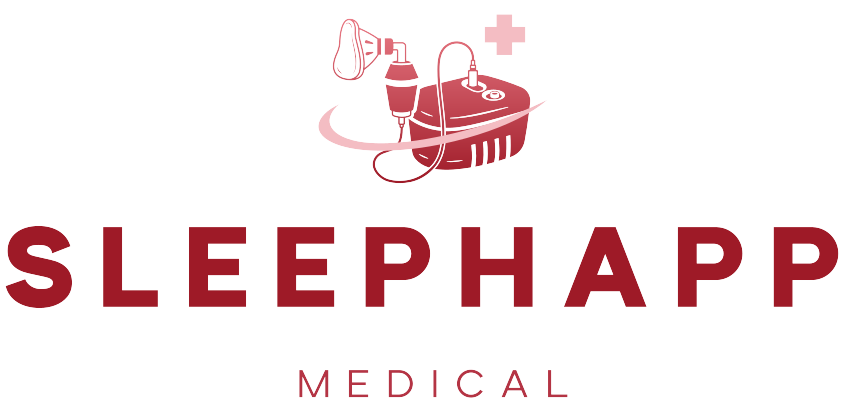Sleep Apnea and Mental Health: Understanding the Connection
Home » Sleep Apnea and Mental Health: Understanding the Connection

Table of Contents
Do you wake up tired and annoyed? Do your days feel heavy? If yes, you might have sleep apnea. It’s a common sleep problem that many people don’t know they have.
Sleep apnea happens when your breathing stops and starts while you sleep. This lowers your sleep quality and reduces oxygen in your body. It causes tiredness and heart problems. It also affects your mental health, but this is not often discussed. Good sleep is important for your mind and emotions. Sleep apnea can disturb this balance.
This article explains how sleep apnea affects mental health, why it happens, and why early diagnosis and treatment matter.
The Connection Between Sleep Apnea and Mental Health
Sleep apnea affects both the body and mind. It can cause mental health problems like depression, anxiety, and mood swings. Poor sleep and low oxygen from sleep apnea can change brain chemicals. These changes may cause emotional problems. Understanding this link helps people get care for both sleep and mental health. Learn more about sleep apnea and mental health here.
How Sleep Apnea Affects Mental Health
Mood Disorders
Sleep apnea can cause mood disorders like depression and anxiety. When breathing stops during sleep, it affects sleep quality. This makes the brain struggle to control emotions. People with sleep apnea often wake up tired, which leads to irritability and mood changes. These problems can lead to depression. Studies show that untreated sleep apnea increases the chance of feeling hopeless, tired, and isolated. Read more about the link between Sleep Apnea and Depression.
Cognitive Impairments
The brain requires sufficient oxygen and restful sleep to function effectively. Sleep apnea disrupts both.
People with sleep apnea often have problems with memory, attention, and decision-making. This can make daily tasks harder and affect work. It can also lower quality of life. Over time, less oxygen to the brain may cause serious brain issues.
Brain Fog
Lack of sleep can make you feel unfocused and distracted. Brain fog happens when sleep patterns are irregular. Broken sleep reduces oxygen to the brain, causing problems. If you can’t concentrate, it’s important to see a doctor. Brain fog can be a sign of long-term sleep loss.
Sleep apnea is a common cause of poor sleep. Treating sleep apnea helps you sleep better. This gives your brain time to heal, reducing brain fog. With treatment, you may feel more focused at work and in life.
Behavior Changes
Sleep deprivation can change behavior over time. It can cause irritability. If someone already has behavior issues, lack of sleep may make it worse.
Cognitive behavioral therapy can help manage behavior problems. Mindfulness and stress-reduction practices can also help. Healthy sleep is important too.
Treating sleep apnea can improve sleep. Keeping a regular sleep schedule and using good sleep habits helps. These methods can also prevent using sedatives or alcohol to sleep. For more information on the relationship between sleep and mental health, visit this article.
Increased Stress Levels
When sleep is often interrupted, stress levels go up. The body’s stress response becomes too active. People with sleep apnea often have higher cortisol, the stress hormone. This can harm mental health. It creates a cycle where poor sleep makes stress worse, and stress disrupts sleep.
Why is Mental Health Linked to Sleep Apnea?
Sleep apnea and mental health disorders are different, but they are connected. They often show similar symptoms. Understanding this link can help veterans understand their conditions. It can also guide them to get the right treatment.
Physiological Triggers
Chronic stress, common in PTSD and anxiety, can cause too many stress hormones. These hormones can disturb sleep and make sleep apnea worse. Mental health disorders like PTSD and depression can change sleep patterns. This includes less REM sleep. These changes can make apneic events happen more often and more severely.
Psychological Triggers
Some people fear not breathing while sleeping or having nightmares. This fear can cause “sleep anxiety,” especially in those with PTSD. Sleep anxiety can make sleep problems worse, like interrupted sleep or apnea. Some medicines for mental health, like benzodiazepines for anxiety, can affect muscles that keep airways open. This may make sleep apnea worse.
Environmental Triggers
Veterans with mental health conditions may have lifestyle habits that worsen sleep. These include substance use and irregular sleep schedules.
Traumatic events or long periods of stress during military service can cause sleep problems and mental health issues.
These experiences can make veterans more likely to have sleep disorders. For more information, visit Obstructive Sleep Apnea and Mental Illness.
Scientific Studies Linking Sleep Apnea and Mental Health
Scientific studies show sleep apnea affects mental health. One study found people with sleep apnea are five times more likely to have depression. Another study showed that using CPAP therapy helps reduce anxiety and improve mental health. These studies show how sleep apnea can cause mental health problems. You can find more studies on PubMed.
The Role of Treatment in Improving Mental Health
CPAP Therapy
CPAP therapy treats sleep apnea. It uses a machine to blow air. The air keeps the airway open during sleep. This therapy helps improve sleep quality. It can also lower depression and anxiety. People feel more awake, refreshed, and balanced after using CPAP regularly.
2. Lifestyle Changes
Simple lifestyle changes can help manage sleep apnea and improve mental health. Here are some tips:
- Weight management: Losing extra weight can reduce airway pressure and help.
- Exercise: Regular exercise improves sleep and lowers stress.
- Sleep hygiene: Make your sleep space quiet, avoid screens before bed, and stick to a sleep schedule. Find tips on improving sleep hygiene.
3. Counseling and Support Groups
Counseling and support groups are important for people with sleep apnea. Therapy, like cognitive-behavioral therapy (CBT), can help with anxiety or depression caused by bad sleep. Joining support groups is also helpful. These groups let people share their experiences and offer support. This can make dealing with sleep apnea easier.
Why Early Diagnosis is Critical
Untreated sleep apnea can cause serious health problems. Lack of oxygen and poor sleep can lead to heart disease, stroke, and dementia. It also affects mental health, causing depression, anxiety, and memory problems. This lowers quality of life. Early diagnosis with a sleep study can help. It prevents complications, improves health and well-being. You can find out more about diagnostic sleep studies.
Conclusion
Sleep apnea affects both physical and mental health. It harms your mood, thinking, and emotions. Understanding this link can help improve mental health and life quality. If you or someone has sleep apnea symptoms, see a doctor. Early diagnosis and treatment are important to stop poor sleep and mental stress. Good sleep is key for a healthy mind and body.
Sources:
- https://lakeshorefamilydentalcare.com/connection-between-sleep-apnea-and-mental-health/
- https://www.hillandponton.com/obstructive-sleep-apnea-mental-illness/
- https://www.sleepcareonline.com/articles/what-is-the-relation-between-sleep-and-mental-health/
- https://betternight.com/news/mental-health-and-sleep-apnea
- https://lethbridgesleepclinic.ca/sleep-apnea-and-mental-health-understanding-the-connection-and-strategies-for-improvement/
- https://www.dentistinmanvel.com/the-impact-of-sleep-apnea-on-your-mental-health/
